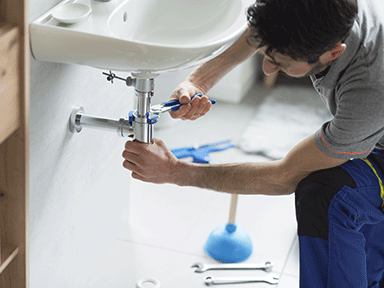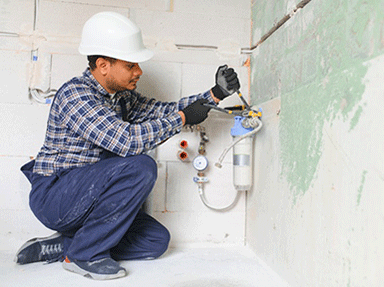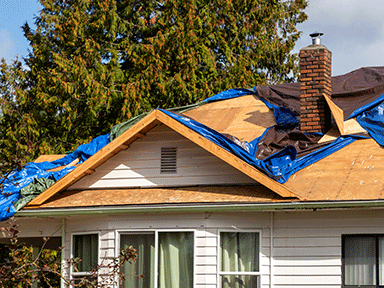There is a good reason why DIY at a rental property is not the best idea – in fact, it can be a really bad idea. One key reason is that it can have serious implications for landlord insurance…
According to a 2024 survey by online tradie marketplace hipages, nearly 4.2 million Australian households experienced a DIY disaster in the past 12 months. While DIY disasters are more common in houses (often due to the complexity and scale of repairs) apartments are not immune:
-
Free-standing houses: 32% of households reported a DIY disaster, with common issues including electrical faults, structural damage, and plumbing leaks.
-
Apartments: 18% of households reported a DIY disaster, with common issues including water damage, wall or fixture repairs, and minor electrical problems.
So why are landlords opting for DIY? For many, the motivation was clear… 69% said they decided to have a go to save on tradie costs and speed up the home improvement process. While most stuck to simpler tasks like painting, cabinetry, and gardening, others ventured into more specialised territory, taking on plumbing, kitchen installations, and even bathroom renovations.
When things go wrong, will landlord insurance step in? No, landlord insurance is unlikely to cover damage caused by DIY efforts, especially when the work should have been carried out by a licensed professional. Here is why…
Act to prevent further loss
When it comes to repair works by unskilled and unqualified tool-wielders, there is a chance that they could cause additional damage or make existing damage worse. This is the complete opposite to the landlord insurance policyholder’s contractual obligation in their policy to ‘act to prevent further loss’.
Policies also exclude damage or loss caused by faulty workmanship or caused by the policyholder, their family members or any person acting with their consent (like a tenant).
Compliance issues
Work done by an unlicensed tradie will not be recognised by insurance companies. Beyond potentially making matters worse, DIY repairs or renovations can create serious safety and compliance risks. This is particularly true for specialised tasks such as plumbing, electrical, structural work, or activities like asbestos removal.
Maintenance
If the policyholder suffers a loss because of illegal, non-compliant or poor-quality works, this could be considered a breach of their insurance policy obligation to keep their premises adequately maintained. As a result, it is unlikely that their claim would be paid (say, for example the property was re-wired by someone who was not a qualified and licensed electrician, and this resulted in an electrical fire that impacted the property).
A false economy
Cutting corners to save costs, whether by taking on repairs personally or hiring an unqualified but inexpensive contractor, can quickly become a false economy. If repairs are carried out by someone unlicensed, it not only increases the risk of faulty work but can also create serious tenant safety risks and hazards. As a result, landlords may face:
-
Significant financial losses if damage occurs and insurance does not cover unlicensed work.
-
Legal or liability issues if a tenant is injured due to unsafe and unlicensed repairs.
Professionals get it wrong too
Any works at the premises, regardless of who is doing them, could result in damage. But, the difference is, any damage caused by a professional tradesperson should be fixed by them as part of their contract to perform work to a certain standard. And, of course, the tradie should be insured themselves. Most trades are required to hold public liability, and sometimes professional indemnity, insurance to carry out paid work. Because they are insured, any damage they cause should be covered, limiting the risk to the property owner – and their insurer.
Avoiding the risk of injury
Landlords should never ask tenants to carry out repairs. If a tenant performs work at the rental property and suffers injury or loss as a result, the landlord could be held legally liable. In such cases, insurers may decline the claim, especially if the landlord knowingly put the tenant at risk.
When it comes to repairs and renovations, anything beyond the most basic tasks is best handled by licensed tradespeople. It protects the property, the people involved, and the landlord’s liability.
To ensure compliance with licensing requirements:
-
Check state or territory regulations – licensing rules for trades such as plumbing, electrical, and building work vary across Australia.
-
Verify the contractor’s licence through your local building authority or fair trading office before any work begins.
-
Keep copies of licences and compliance certificates as part of your property records
-
Engage only insured professionals. This provides added protection in case of faults, damage, or injury.
To sum it up
| Who does the work | Is insurance held? | Is damage covered? |
|---|---|---|
| Licensed/professional tradesperson | Yes (public liability, sometimes professional indemnity) | Yes, damage is typically covered via the tradesperson’s insurance. |
| Unlicensed tradie or DIY worker | No | No, damage is not typically covered. |
| Policyholder, tenant, or family member | No | No, damage is not typically covered. |
Saving money by opting to DIY might seem like a good idea, but if things go wrong it could end up costing much more than a tradie’s call-out fee. No matter how ‘handy’ they think they are, owners and tenants need to ‘step away from the power tools’. To safeguard insurance cover, landlords and property managers should engage appropriately skilled and insured trades professionals to undertake repairs and renovations at the investment property.
If you have questions about cover for repairs in EBM RentCover landlord policies, reach out to a member of our Expert Care team – 1800 661 662.
*While we have taken care to ensure the information above is true and correct at the time of publication, changes in circumstances and legislation after the displayed date may impact the accuracy of this article. If you need us we are here, contact 1800 661 662 if you have any questions.
You may also like
View all
When a rental suffers damage, some repairs are emergencies and they require urgent fixing. Here are the details...

When your rental suffers damage, some repairs are considered ‘urgent’ and must be completed within legislated timeframes. Here is the reason...

There is a condition in landlord insurance policies that requires the policyholder to ‘act to prevent further loss’. What does this mean?...




